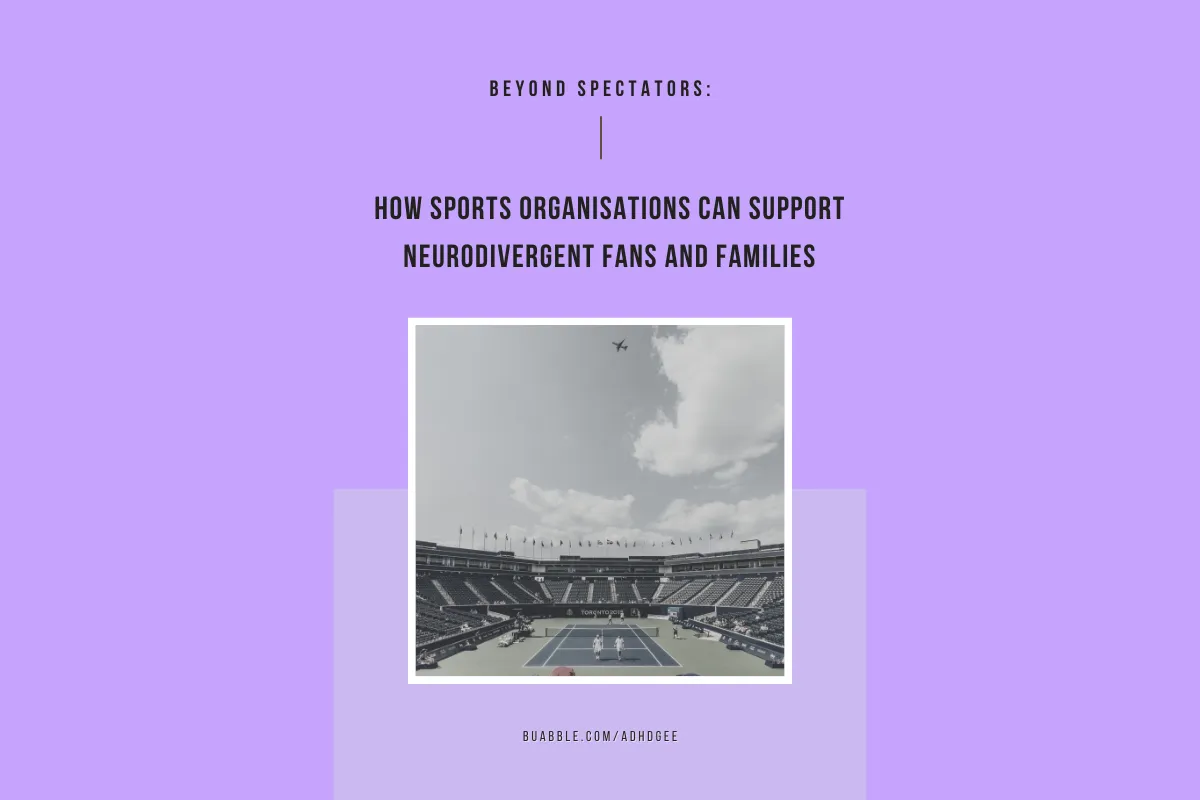
Beyond Spectators: How Sports Organisations Can Support Neurodivergent Fans and Families
Beyond Spectators: How Sports Organisations Can Support Neurodivergent Fans and Families
The emotional highs of a hard-fought victory. The communal energy of thousands chanting in unison. The unpredictable roars that erupt when the unexpected happens. These quintessential sporting experiences, which are central to fan culture around the world, can be simultaneously appealing and overwhelming for neurodivergent supporters.
Recent research from the European Stadium & Safety Management Association reveals a startling reality: while approximately 15-20% of the general population is neurodivergent, less than 4% regularly attend live sporting events. This represents not just a social inclusion failure, but a significant missed opportunity for sports organisations seeking to expand their supporter base.

Current Barriers To The Traditional Fan Experience
A 2023 comprehensive study spanning 18 countries across Europe and the Middle East identified four primary barriers preventing neurodivergent individuals from fully participating in sports fandom:
Overwhelming sensory environments: Standard stadium experiences feature unpredictable noise levels, visual overstimulation, and physical crowding that can trigger sensory overload. Research from Saudi Arabia's Sports Accessibility Commission found that 72% of neurodivergent respondents cited sensory concerns as their primary reason for avoiding live events.
Inflexible attendance protocols: Rigid entry procedures, assigned seating requirements, and limited movement options create significant barriers. The UEFA Fan Experience Report documented that flexibility in these areas improved neurodivergent attendance by 58% in pilot programs.
Communication challenges: Traditional fan engagement relies heavily on social communication styles that may disadvantage neurodivergent supporters. A Turkish Football Federation survey found that 63% of autistic fans felt excluded from typical fan interactions despite strong team loyalties.
Limited staff awareness: The European Sport Inclusion Network's audit of 124 sporting venues found that less than 8% of frontline staff had received any training in recognising or supporting neurodivergent spectators.
Pioneering Solutions: Case Studies in Inclusive Support
Despite these barriers, several organisations across Europe and the Middle East have implemented successful inclusion initiatives:
Sensory Mapping and Modifications
The Emirates Football Association's "Inclusive Stadium Initiative" has pioneered comprehensive sensory mapping for all major facilities, creating detailed guides that allow neurodivergent fans to plan their experience. This approach reduced reported negative experiences by 47% in the first year.
Similarly, Germany's Bundesliga now requires all top-tier clubs to provide sensory kits (including noise-canceling headphones, weighted lap pads, and communication cards) available for checkout at all matches.
Flexible Attendance Options
France's "Liberty Support" program allows neurodivergent supporters to purchase flexible tickets that permit designated quiet areas for retreat without missing the action. Stadium designs now increasingly include sensory rooms with views of the playing area and real-time game feeds.
Staff Training and Support Personnel
Qatar's groundbreaking preparation for the 2022 World Cup included mandatory neurodiversity training for all event staff, with specialised "Access Ambassadors" stationed throughout venues. This model has since been adopted by sports organisations in seven other Middle Eastern countries.
Digital Preparation Tools
Israel's Basketball Super League has developed comprehensive "pre-visit experiences", virtual tours with actual sensory elements included, allowing neurodivergent fans to prepare for the real experience. Their post-implementation research shows a 61% increase in neurodivergent family attendance.
Beyond Access: The Business and Community Case
The economic impact of inclusive fan experiences extends beyond ticket sales. Research conducted by the European Sports Economics Institute found that:
Families with neurodivergent members spend 28% more on merchandise when they feel accommodated at events
Inclusion initiatives generate positive media coverage valued at approximately €3.4 million annually across major European leagues
Organisations implementing comprehensive neurodiversity programs report 34% higher fan loyalty metrics
Inclusive facilities attract corporate partnerships specifically tied to social responsibility initiatives
Implementation Framework: From Policy to Experience
Based on successful implementations across the regions, sports organisations can follow this evidence-based framework:
Assessment and Environment
Conduct professional sensory audits of facilities with neurodivergent consultants
Create detailed sensory maps available through multiple channels
Designate and clearly mark quiet zones and sensory retreat spaces
Implement staff identification systems for those with specialised training
Communication and Preparation
Develop "pre-visit guides" with actual sensory information
Create clear visual communication systems throughout venues
Establish dedicated communication channels for accommodation requests
Provide social narratives explaining typical event sequences
Training and Personnel
Implement mandatory neurodiversity training for all fan-facing staff
Recruit neurodivergent individuals for advisory roles in fan experience planning
Create designated support roles during events
Establish feedback mechanisms specific to neurodivergent fan experiences
Policy Development
Create explicit anti-discrimination policies covering neurodevelopmental differences
Establish accommodation request procedures with appropriate privacy protections
Develop emergency protocols that account for neurodivergent needs
Include neurodivergent perspectives in all fan experience planning committees
The Future of Fandom: Neurodivergent Supporters as Assets
The most successful sports organisations are recognising that neurodivergent fans bring valuable perspectives to sporting culture. The Dutch Eredivisie's "Diverse Supporter Initiative" has documented how neurodivergent fan advisory groups have improved the overall experience for all attendees through their detailed attention to sensory and logistical pain points.
As Ioanna Paraskevopoulou, board member of the EPAS Bureau notes:
"When we design our stadiums and supporter experiences to accommodate neurodivergent fans, we create better environments for everyone. Their perspectives help us identify improvements we might otherwise miss."
By transforming their approach from minimal accommodation to active inclusion, European and Middle Eastern sports organisations have the opportunity to expand their supporter base while simultaneously fulfilling their social responsibility to reflect the full spectrum of human neurology in their fan communities.
👉 Want help making neuroinclusion a reality at your organisation?
Let’s work together.
📩 Get in touch for a free Introductory Conversation on [email protected]
